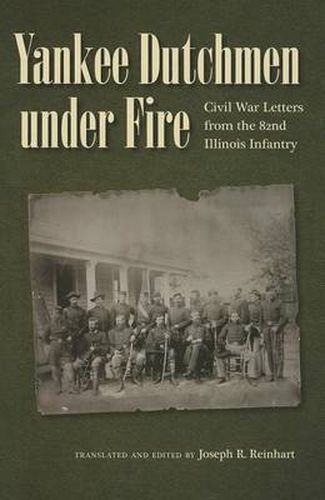Readings Newsletter
Become a Readings Member to make your shopping experience even easier.
Sign in or sign up for free!
You’re not far away from qualifying for FREE standard shipping within Australia
You’ve qualified for FREE standard shipping within Australia
The cart is loading…






Life and death, pride and prejudice, and combat in an ethnic Civil War regiment
Thousands of volumes of Civil War letters are available, but little more than a dozen contain collections written by native Germans fighting in this great American conflict. Yankee Dutchmen under Fire presents a fascinating collection of sixty-one letters written by immigrants who served in the 82nd Illinois Volunteer Infantry Regiment. The 82nd Illinois was one of the thirty or so predominantly German Regiments in the Union army, and one of only two Federal regiments containing a Jewish company. Fighting alongside the Germans was a company of Scandinavians, plus a scattering of immigrants from many other countries.
The letters span nearly three years of war and include firsthand accounts of major battles: Chancellorsville and Gettysburg in the East and Missionary Ridge, Resaca, New Hope Church, and Kolb’s Farm in the West. The soldiers of the 82nd Illinois also describe campaigning in East Tennessee, Sherman’s Atlanta campaign and his March to the Sea, and the Carolinas campaign (including the Battle of Bentonville).
The majority of the letters originally appeared in wartime issues of German American newspapers and kept the German community informed of the regiment’s marches, camps, battles, and casualties. Lt. (later Capt.) Rudolph Muller, an idealistic and highly critical commentator, wrote twenty-one of the twenty-nine private letters to his close friend and confidant Col. Friedrich Hecker. Muller cautioned the colonel not to make his letters public because they often contained highly critical comments about commanders, fellow officers, public figures, Anglo-Americans, and American society.
Besides providing details of military life and combat, the documents reveal how the German-born writers viewed the war, American officers and enlisted men, other immigrant soldiers, and the enemy. They shed light on the ethnic dimensions of the war, including ethnic identity, ethnic pride and prejudice, and ethnic solidarity, and they reflect the overarching political climate in which the war was fought. Yankee Dutchmen under Fire is a valuable addition to Civil War studies and will also be welcomed by those interested in ethnicity and immigration.
$9.00 standard shipping within Australia
FREE standard shipping within Australia for orders over $100.00
Express & International shipping calculated at checkout
Life and death, pride and prejudice, and combat in an ethnic Civil War regiment
Thousands of volumes of Civil War letters are available, but little more than a dozen contain collections written by native Germans fighting in this great American conflict. Yankee Dutchmen under Fire presents a fascinating collection of sixty-one letters written by immigrants who served in the 82nd Illinois Volunteer Infantry Regiment. The 82nd Illinois was one of the thirty or so predominantly German Regiments in the Union army, and one of only two Federal regiments containing a Jewish company. Fighting alongside the Germans was a company of Scandinavians, plus a scattering of immigrants from many other countries.
The letters span nearly three years of war and include firsthand accounts of major battles: Chancellorsville and Gettysburg in the East and Missionary Ridge, Resaca, New Hope Church, and Kolb’s Farm in the West. The soldiers of the 82nd Illinois also describe campaigning in East Tennessee, Sherman’s Atlanta campaign and his March to the Sea, and the Carolinas campaign (including the Battle of Bentonville).
The majority of the letters originally appeared in wartime issues of German American newspapers and kept the German community informed of the regiment’s marches, camps, battles, and casualties. Lt. (later Capt.) Rudolph Muller, an idealistic and highly critical commentator, wrote twenty-one of the twenty-nine private letters to his close friend and confidant Col. Friedrich Hecker. Muller cautioned the colonel not to make his letters public because they often contained highly critical comments about commanders, fellow officers, public figures, Anglo-Americans, and American society.
Besides providing details of military life and combat, the documents reveal how the German-born writers viewed the war, American officers and enlisted men, other immigrant soldiers, and the enemy. They shed light on the ethnic dimensions of the war, including ethnic identity, ethnic pride and prejudice, and ethnic solidarity, and they reflect the overarching political climate in which the war was fought. Yankee Dutchmen under Fire is a valuable addition to Civil War studies and will also be welcomed by those interested in ethnicity and immigration.